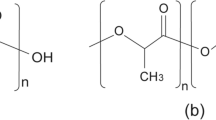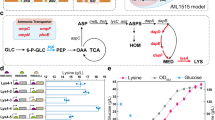Abstract
The first biosynthetic system for lactate (LA)-based polyesters was previously created in recombinant Escherichia coli (Taguchi et al. 2008). Here, we have begun efforts to upgrade the prototype polymer production system to a practical stage by using metabolically engineered Gram-positive bacterium Corynebacterium glutamicum as an endotoxin-free platform. We designed metabolic pathways in C. glutamicum to generate monomer substrates, lactyl-CoA (LA-CoA), and 3-hydroxybutyryl-CoA (3HB-CoA), for the copolymerization catalyzed by the LA-polymerizing enzyme (LPE). LA-CoA was synthesized by D-lactate dehydrogenase and propionyl-CoA transferase, while 3HB-CoA was supplied by β-ketothiolase (PhaA) and NADPH-dependent acetoacetyl-CoA reductase (PhaB). The functional expression of these enzymes led to a production of P(LA-co-3HB) with high LA fractions (96.8 mol%). The omission of PhaA and PhaB from this pathway led to a further increase in LA fraction up to 99.3 mol%. The newly engineered C. glutamicum potentially serves as a food-grade and biomedically applicable platform for the production of poly(lactic acid)-like polyester.





Similar content being viewed by others
References
Arai Y, Nakashita H, Suzuki Y, Kobayashi Y, Shimizu T, Yasuda M, Doi Y, Yamaguchi I (2002) Synthesis of a novel class of polyhydroxyalkanoates in Arabidopsis peroxisomes, and their use in monitoring short-chain-length intermediates of β-oxidation. Plant Cell Physiol 43:555–562
Auras R, Harte B, Selke S (2004) An overview of polylactides as packaging materials. Macromol Biosci 4:835–864
Bunch PK, Mat-Jan F, Lee N, Clark DP (1997) The ldhA gene encoding the fermentative lactate dehydrogenase of Escherichia coli. Microbiology 143:187–195
Caspi R, Altman T, Dale JM, Dreher K, Fulcher CA, Gilham F, Kaipa P, Karthikeyan AS, Kothari A, Krummenacker M, Latendresse M, Mueller LA, Paley S, Popescu L, Pujar A, Shearer AG, Zhang P, Karp PD (2010) The MetaCyc database of metabolic pathways and enzymes and the BioCyc collection of pathway/genome databases. Nucleic Acids Res 38:D473–D479
Chang DE, Jung HC, Rhee JS, Pan JG (1999) Homofermentative production of d- or l-lactate in metabolically engineered Escherichia coli RR1. Appl Environ Microbiol 65:1384–1389
Elsden SR, Gilchrist FM, Lewis D, Volcani BE (1956) Properties of a fatty acid forming organism isolated from the rumen of sheep. J Bacteriol 72:681–689
Furrer P, Zinn M, Panke S (2007) Efficient recovery of low endotoxin medium-chain-length poly([R]-3-hydroxyalkanoate) from bacterial biomass. J Microbiol Methods 69:206–213
Han X, Satoh Y, Satoh T, Matsumoto K, Kakuchi T, Taguchi S, Dairi T, Munekata M, Tajima K (2011) Chemo-enzymatic synthesis of polyhydroxyalkanoate (PHA) incorporating 2-hydroxybutyrate by wild-type class I PHA synthase from Ralstonia eutropha. Appl Microbiol Biotechnol 92:509–517
Inui M, Murakami S, Okino S, Kawaguchi H, Vertes AA, Yukawa H (2004) Metabolic analysis of Corynebacterium glutamicum during lactate and succinate productions under oxygen deprivation conditions. J Mol Microbiol Biotechnol 7:182–196
Jo SJ, Leong CR, Matsumoto K, Taguchi S (2009) Dual production of poly(3-hydroxybutyrate) and glutamate using variable biotin concentrations in Corynebacterium glutamicum. J Biosci Bioeng 107:409–411
Jo SJ, Maeda M, Ooi T, Taguchi S (2006) Production system for biodegradable polyester polyhydroxybutyrate by Corynebacterium glutamicum. J Biosci Bioeng 102:233–236
Jo SJ, Matsumoto K, Leong CR, Ooi T, Taguchi S (2007) Improvement of poly(3-hydroxybutyrate) [P(3HB)] production in Corynebacterium glutamicum by codon optimization, point mutation and gene dosage of P(3HB) biosynthetic genes. J Biosci Bioeng 104:457–463
Kikuchi Y, Date M, Yokoyama K, Umezawa Y, Matsui H (2003) Secretion of active-form Streptoverticillium mobaraense transglutaminase by Corynebacterium glutamicum: processing of the pro-transglutaminase by a cosecreted subtilisin-like protease from Streptomyces albogriseolus. Appl Environ Microbiol 69:358–366
Lee SY, Choi JI, Han K, Song JY (1999) Removal of endotoxin during purification of poly(3-hydroxybutyrate) from Gram-negative bacteria. Appl Environ Microbiol 65:2762–2764
Leuchtenberger W, Huthmacher K, Drauz K (2005) Biotechnological production of amino acids and derivatives: current status and prospects. Appl Microbiol Biotechnol 69:1–8
Liebl W, Bayerl A, Schein B, Stillner U, Schleifer KH (1989) High efficiency electroporation of intact Corynebacterium glutamicum cells. FEMS Microbiol Lett 53:299–303
Madhavan Nampoothiri K, Nair NR, John RP (2010) An overview of the recent developments in polylactide (PLA) research. Biores Technol 101:8493–8501
Matsumoto K, Ishiyama A, Sakai K, Shiba T, Taguchi S (2011) Biosynthesis of glycolate-based polyesters containing medium-chain-length 3-hydroxyalkanoates in recombinant Escherichia coli expressing engineered polyhydroxyalkanoate synthase. J Biotechnol 156:214–217
Matsumoto K, Kitagawa K, Jo SJ, Song Y, Taguchi S (2010) Production of poly(3-hydroxybutyrate-co-3-hydroxyvalerate) in recombinant Corynebacterium glutamicum using propionate as a precursor. J Biotechnol 152:144–146
Matsumoto K, Taguchi S (2009) Enzymatic and whole-cell synthesis of lactate-containing polyesters: toward the complete biological production of polylactate. Appl Microbiol Biotechnol 85:921–932
Matsumoto K, Takase K, Aoki E, Doi Y, Taguchi S (2005) Synergistic effects of Glu130Asp substitution in the type II polyhydroxyalkanoate (PHA) synthase: enhancement of PHA production and alteration of polymer molecular weight. Biomacromolecules 6:99–104
Okino S, Inui M, Yukawa H (2005) Production of organic acids by Corynebacterium glutamicum under oxygen deprivation. Appl Microbiol Biotechnol 68:475–480
Okino S, Suda M, Fujikura K, Inui M, Yukawa H (2008) Production of d-lactic acid by Corynebacterium glutamicum under oxygen deprivation. Appl Microbiol Biotechnol 78:449–454
Peoples OP, Sinskey AJ (1989) Poly-β-hydroxybutyrate biosynthesis in Alcaligenes eutrophus H16. Characterization of the genes encoding β-ketothiolase and acetoacetyl-CoA reductase. J Biol Chem 264:15293–15297
Plassmeier J, Persicke M, Pühler A, Sterthoff C, Rückert C, Kalinowski J (2011) Molecular characterization of PrpR, the transcriptional activator of propionate catabolism in Corynebacterium glutamicum. J Biotechnol. doi:10.1016/j.jbiotec.2011.09.009
Schneider J, Niermann K, Wendisch VF (2010) Production of the amino acids l-glutamate, l-lysine, l-ornithine and l-arginine from arabinose by recombinant Corynebacterium glutamicum. J Biotechnol 154:191–198
Shiio I, Otsuka S, Takahashi M (1962) Effect of biotin on the bacterial formation of glutamic acid. J Biochem 51:56–62
Shozui F, Matsumoto K, Motohashi R, Sun J, Satoh T, Kakuchi T, Taguchi S (2011) Biosynthesis of a lactate (LA)-based polyester with a 96 mol% LA fraction and its application to stereocomplex formation. Polym Degrad Stab 96:499–504
Shozui F, Matsumoto K, Nakai T, Yamada M, Taguchi S (2009) Biosynthesis of novel terpolymers poly(lactate-co-3-hydroxybutyrate-co-3-hydroxyvalerate)s in lactate-overproducing mutant Escherichia coli JW0885 by feeding propionate as a precursor of 3-hydroxyvalerate. Appl Microbiol Biotechnol 85:949–954
Taguchi S, Doi Y (2004) Evolution of polyhydroxyalkanoate (PHA) production system by “enzyme evolution”: successful case studies of directed evolution. Macromol Biosci 4:145–156
Taguchi S, Yamada M, Matsumoto K, Tajima K, Satoh Y, Munekata M, Ohno K, Kohda K, Shimamura T, Kambe H, Obata S (2008) A microbial factory for lactate-based polyesters using a lactate-polymerizing enzyme. Proc Natl Acad Sci U S A 105:17323–17327
Tajima K, Satoh Y, Satoh T, Itoh R, Han XR, Taguchi S, Kakuchi T, Munekata M (2009) Chemo-enzymatic synthesis of poly(lactate-co-(3-hydroxybutyrate)) by a lactate-polymerizing enzyme. Macromolecules 42:1985–1989
Takase K, Taguchi S, Doi Y (2003) Enhanced synthesis of poly(3-hydroxybutyrate) in recombinant Escherichia coli by means of error-prone PCR mutagenesis, saturation mutagenesis, and in vitro recombination of the type II polyhydroxyalkanoate synthase gene. J Biochem 133:139–145
Toyoda K, Teramoto H, Inui M, Yukawa H (2009) The ldhA gene, encoding fermentative l-lactate dehydrogenase of Corynebacterium glutamicum, is under the control of positive feedback regulation mediated by LldR. J Bacteriol 191:4251–4258
Valappil SP, Boccaccini AR, Bucke C, Roy I (2007) Polyhydroxyalkanoates in Gram-positive bacteria: insights from the genera Bacillus and Streptomyces. Antonie Van Leeuwenhoek 91:1–17
Wittmann C, Becker J, Klopprogge C, Zelder O, Heinzle E (2005) Amplified expression of fructose 1,6-bisphosphatase in Corynebacterium glutamicum increases in vivo flux through the pentose phosphate pathway and lysine production on different carbon sources. Appl Microbiol Biotechnol 71:8587–8596
Yamada M, Matsumoto K, Nakai T, Taguchi S (2009) Microbial production of lactate-enriched poly[(R)-lactate-co-(R)-3-hydroxybutyrate] with novel thermal properties. Biomacromolecules 10:677–681
Yamada M, Matsumoto K, Shimizu K, Uramoto S, Nakai T, Shozui F, Taguchi S (2010) Adjustable mutations in lactate (LA)-polymerizing enzyme for the microbial production of LA-based polyesters with tailor-made monomer composition. Biomacromolecules 11:815–819
Yamada M, Matsumoto K, Uramoto S, Motohashi R, Abe H, Taguchi S (2011) Lactate fraction dependent mechanical properties of semitransparent poly(lactate-co-3-hydroxybutyrate)s produced by control of lactyl-CoA monomer fluxes in recombinant Escherichia coli. J Biotechnol 154:255–260
Acknowledgments
We thank Dr. Jens Plassmeier for helpful discussions. The work described here was partially supported by a Grant-in-Aid for Scientific Research of Japan (no. 23310059) (to S.T.), and the Global COE Program (project no. B01: Catalysis as the Basis for Innovation in Materials Science) (to Y.S.), all from the Ministry of Education, Culture, Sports, Science and Technology, Japan.
Author information
Authors and Affiliations
Corresponding author
Rights and permissions
About this article
Cite this article
Song, Y., Matsumoto, K., Yamada, M. et al. Engineered Corynebacterium glutamicum as an endotoxin-free platform strain for lactate-based polyester production. Appl Microbiol Biotechnol 93, 1917–1925 (2012). https://doi.org/10.1007/s00253-011-3718-0
Received:
Revised:
Accepted:
Published:
Issue Date:
DOI: https://doi.org/10.1007/s00253-011-3718-0




